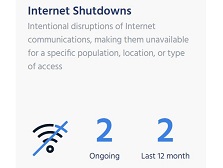Ethiopia’s Internet providers are implementing best current practices to safeguard the country’s Internet infrastructure from emerging threats, according to a report from Internet Society Pulse.
Currently, 99 percent of all 366,600 IPv4 addresses assigned to the country’s Internet networks have been cryptographically signed, which helps reduce common routing errors and prevents malicious and accidental hijacks that can potentially take countries offline. This noteworthy accomplishment is complemented by the nation’s 100 percent protection against Distributed Denial of Service (DDoS) attacks, marking a significant stride in fortifying the country’s cyber resilience.
Malicious actors use DDoS attacks to make an online service unavailable by overwhelming it with traffic from multiple sources. They target essential resources, including banks and news websites, and present a significant challenge to ensuring people can publish and access important information.
Dawit Bekele, the Internet Society’s Regional Vice President for Africa, says, “In a world where the impact of routing incidents and DDoS attacks on daily life cannot be overstated, Ethiopia’s proactive approach to network security sets a commendable precedent in the African region,”
“Routing security is crucial in safeguarding against malicious network threats that can potentially disrupt entire countries or compromise individual and organisational data. Ethiopia’s efforts in establishing a secure routing infrastructure underscores its dedication to maintaining a reliable and resilient Internet landscape,” added Dawit.
The Internet landscape in Africa, specifically Ethiopia, is poised for rapid growth in the coming years. Per the report, only 17 percent of Ethiopians currently use the Internet. With the remaining 100 million Ethiopians yet to connect to the Internet, widespread adoption of IPv6 is imperative to ensure sustainable growth and inclusivity.
IPv6 is the next-generation Internet Protocol (IP) standard intended to eventually replace IPv4, which many Internet services still use today. IPv6 is a well-established protocol that is seeing increased deployment and adoption, particularly in mobile phone markets, as it enables networks to connect more devices and expand their networks without relying on additional resources. According to the report, there is only one percent adoption of IPv6 in Ethiopia and a four percent average in Africa.
The telecommunications market in Ethiopia is transitioning from a single government-owned operator that controlled the market until 2019 to a duopoly with the entrance of Safaricom Ethiopia in 2022. Dawit says, “As Ethiopia’s market starts to open up, there is an opportunity for its service providers to apply the best current security practices they are currently applying in other areas of their networks and adopt IPv6.”
Greater competition can help increase spending on more robust and secure telecommunication infrastructure and performance. Maintaining its current security resilience successes will benefit the entire nation and the African continent. The Internet Society Pulse Country Report for Ethiopia highlights that governments, technology stakeholders, and industry players must work together to prioritize competition and open the market to increase Internet resilience.

